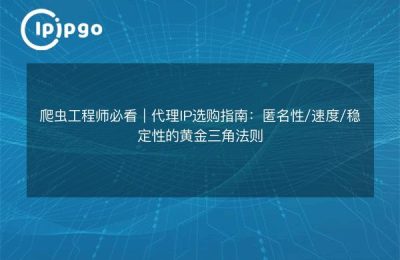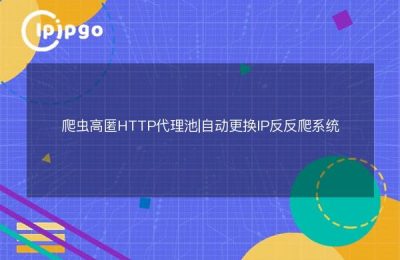
In the Internet age, data is the new gold. Whether it is an enterprise or an individual, the ability to acquire and analyze data is particularly important. Among the many means of data acquisition, the use of crawler technology is undoubtedly an efficient and widely used method. However, crawlers often encounter the problem of IP blocking in practice. In order to solve this problem, proxy IP pools have emerged. In this article, we will introduce the operation principle of proxy IP pool and its application in Scrapy crawler.
What is a proxy IP pool?
Proxy IP pool, as the name suggests, is a set of proxy IP addresses that can be used by the crawler program. Whenever the crawler sends out a request, it can randomly select a proxy IP, thus avoiding the risk of blocking the target website caused by frequent visits to the target website using a single IP address. The existence of a proxy IP pool not only improves the stability of the crawler, but also greatly increases the success rate of data capture.
Proxy IP Pool Construction
Building an efficient proxy IP pool is not an easy task and requires several factors to be considered. The first is the source of proxy IPs. Generally speaking, proxy IPs can be obtained by purchasing, obtaining for free, or building your own proxy server. Purchasing a proxy IP costs more, but it is usually of better quality and higher stability; free proxy IPs may have problems such as instability and slow speed. Free proxy IPs can be unstable and slow. Building your own proxy server requires a certain amount of technical foundation and maintenance costs.
Next is the verification of the proxy IP. After obtaining the proxy IP, it needs to be verified to ensure its availability and speed. This can be done by writing scripts that periodically test the proxy IP to eliminate invalid and slower IP addresses.
Proxy IP Pool Application in Scrapy Crawler
Scrapy is a very powerful Python crawler framework, and using proxy IP pools can greatly enhance its data crawling capabilities. Below is a simple sample code showing how to integrate proxy IP pooling in Scrapy.
import random
from scrapy import signals
class ProxyMiddleware.
def __init__(self, proxy_list): self.proxy_list = proxy_list.
self.proxy_list = proxy_list
@classmethod
def from_crawler(cls, crawler): return cls().
return cls(
proxy_list=crawler.settings.get('PROXY_LIST')
)
def process_request(self, request, spider): proxy = random.choice(self, request, spider).
proxy = random.choice(self.proxy_list)
request.meta['proxy'] = proxy
# settings.py
PROXY_LIST = [
'http://123.123.123.123:8080',
'http://234.234.234.234:8080'.
# More proxy IPs
]
DOWNLOADER_MIDDLEWARES = {
'myproject.middlewares.ProxyMiddleware': 543,
}The above code demonstrates a simple proxy IP pool middleware that sends requests by randomly selecting proxy IPs. This effectively avoids the problem of IP blocking.
Proxy IP pool maintenance
The maintenance of the proxy IP pool is equally important because the availability of proxy IPs changes over time. Proxy IPs need to be tested regularly, invalid IPs need to be eliminated, and new proxy IPs need to be added continuously. in addition, new proxy IPs can be obtained regularly through some public proxy IP websites.
In practice, this process can be automated through timed tasks such as Cron Jobs to ensure that the proxy IP pool remains efficient and stable.
Advantages and Challenges of Proxy IP Pools
The biggest advantage of using a proxy IP pool is that it can significantly improve the success rate and stability of the crawler, and avoid being blocked due to frequent visits from a single IP. In addition, proxy IP pools can also help crawlers bypass some geographic restrictions and obtain more data.
However, proxy IP pools also face some challenges. The first is the quality of the proxy IPs; low-quality proxy IPs may result in failed or slow requests. Second is the cost of maintenance; proxy IP pools need to be regularly updated and tested to ensure their availability and efficiency.
summarize
Proxy IP pool as an important tool in crawling technology, its importance is self-evident. By building and maintaining an efficient proxy IP pool, the stability of the crawler and its ability to capture data can be greatly improved. However, the construction and maintenance of the proxy IP pool also requires a certain amount of resources and effort. I hope this article can provide some useful reference for you in the actual operation.
If you are looking for high quality proxy IP services, try our proxy IP products. We provide stable and efficient proxy IP to help you easily deal with various challenges in crawling.








